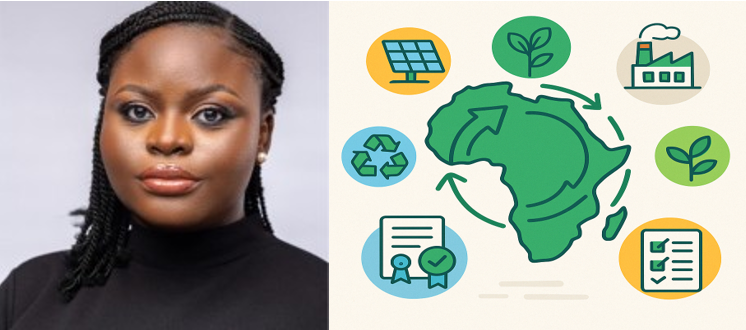Standardization and certification : unlocking circular economy growth in Africa
According to environmental sustainability advocate Tolulope Omoyeni, standardization and certification are critical tools to unlock the growth of Africa’s circular economy. In this opinion piece, she calls for Africa-specific benchmarks to turn green commitments into measurable, recognized action.

By Tolulope Omoyeni*
« How can we get audited and certified? »
That was the question an Asset Engineer from the West Africa headquarters of a German company in Lagos asked me during a conversation in January. His company had successfully transitioned about 60% of their energy reliance from fossil fuels to renewables, and they were eager to get certified for their sustainability efforts.
He went on to mention that their global headquarters, located on another continent, had recently been audited and certified for meeting sustainability benchmarks in that region. This recognition fueled their drive to do even better, hoping to be the second in their company to achieve such certification.
This conversation has stayed with me, and as I prepared to represent Dr. Natalie Beinisch at the Omniverse Africa 2025 Roundtable Discussion, it became even more relevant.
On February 25, 2025, I had the privilege of representing my boss, Dr. Natalie Beinisch, at the Omniverse Africa 2025 Roundtable Discussion, hosted by Bandung Africa, Ajoba Development Foundation, and the Nigeria Climate Innovation Centre.
The theme was:
« Unlocking Africa’s Potential in Nature Finance and Bio-Economy while Scaling the Role of Women in the Nigerian Emerging Climate/Green Economy: Policies, Tech, and Sustainability. »
In preparing for this discussion, I reflected on the Asset Engineer’s question and realized how much standardization and certification matter for accelerating Africa’s circular economy.
Why Standardization and Certification Matter for Circular Economy
Circular Economy Thrives on Motivation
For businesses to adopt circular economy practices, there must be a motivation, whether it is financial, reputational, or regulatory. Certification acts as an incentive, giving businesses a benchmark to strive for while creating visibility for their efforts.
Certification Fuels Healthy Competition
The German company’s pursuit of sustainability certification was driven not just by internal goals but also by competition. When organizations see others being recognized, they are inspired to follow suit. This kind of ripple effect can mainstream circular economy practices in the green economy.
Unlike in some developed regions where sustainability standards are well established, Africa still faces gaps in regulatory frameworks, standardization, and certification processes. We need:
- Sustainability benchmarks for products, services, and processes.
- A structured certification system that qualifies businesses for regulatory incentives (such as tax breaks, subsidies, and access to green funds).
A well-defined certification system would not only encourage businesses to integrate sustainability but also create a policy framework that rewards organizations for meeting environmental targets.
The process of setting sustainability benchmarks is complex as it requires research, testing, and piloting across various sectors. However, it is not impossible. Through public-private partnerships, academic collaboration, and regulatory support, we can create a pathway for sustainability certification tailored to Africa’s unique context.
If international companies are actively seeking certification in local communities they are present in, we can be certain that many other businesses are doing the same. This is a call for action—a call for collaboration between governments, businesses, academia, and civil society to:
- Develop Africa-focused sustainability benchmarks and certification systems.
- Design policies that reward compliance and penalize greenwashing.
- Ensure that the circular economy is not just a concept but a practical, scalable movement.
As we push for a more sustainable and circular economy, what policy shifts do you think are needed to accelerate standardization and certification in Africa?
Let’s keep the conversation going. Your insights matter.
*Tolulope Omoyeni is a passionate advocate for environmental sustainability and climate education, recognized as a Green Ambassador and SDGs-certified leader. She is also a Woman@Dior mentee and a Climate Education Leaders Fellow.






